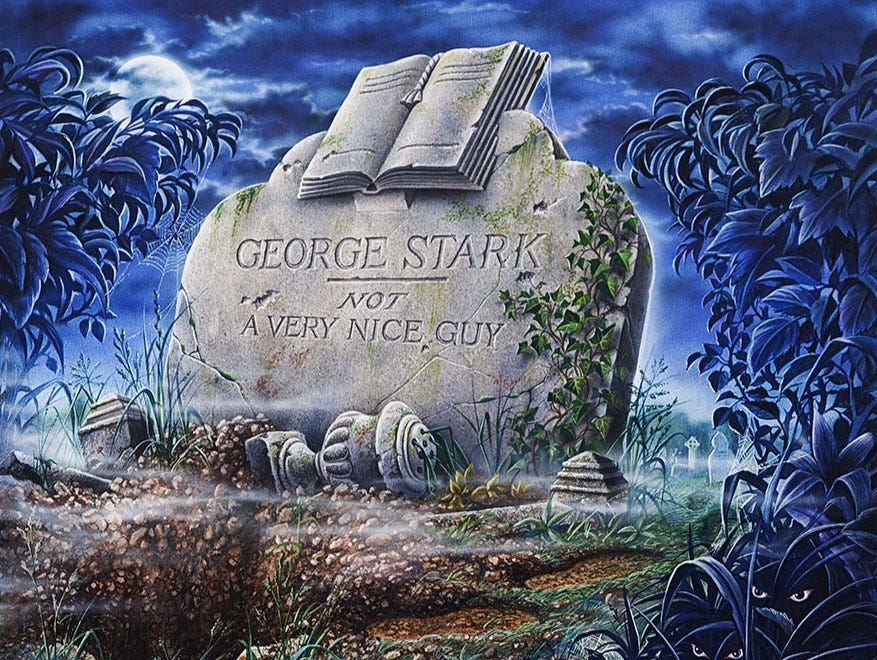
I’m still plowing through Stephen King novels. The man is so impossibly prolific I could keep going for years just by sticking to the books I already have on my shelf – less than half of his total output – even if I weren’t regularly splicing other writers into the rotation to keep things fresh.1 “Constant Reader,” that classic Kingian designation, feels appropriate for this moment.
I wish I could say I’ve been keeping up the pace with writing, too. For a while, it was easy: 500+ words of fiction a day, a regular dose of nonfiction for Substack, and weekly journal entries for yet another project. Respectable numbers, and this isn’t even counting the writing I do for my day job. Writing-wise, the second half of 2022 was the most productive I’ve ever been, and I fully intended to keep up the pace this year.
Instead, I’ve been slowing down. I’m not sure that the reasons why are worth getting into – at times, I’m not even entirely sure what they are – but the writing habits I so carefully cultivated have mostly rotted away, leaving only a dried-out husk.
Nothing I’ve tried to correct this seems to work, or to stick. I’ve done the regular schedule thing; I’ve tried waiting for inspiration; I’ve tried blending the two strategies in hopes of at least getting something on the page. But no matter what I do, I come up short, if not empty. A shift has occurred, too fundamental for me to overcome. So I’ve been trying to relight that fire the only way I know how: reading. Constantly reading, in hopes that the right book at the right moment might trigger the writing impulse again.
Certain books lay down roots in your mind; for me, Stephen King’s The Dark Half is one such book. Its protagonist, Thaddeus Beaumont, writes violent gangster novels under the pseudonym George Stark, and while these novels are bestsellers, Thad plans on retiring his pen name. He and his wife Liz have announced the move in a People magazine story, complete with tacky photos of a fake headstone that reads:
GEORGE STARK
1975-1988
Not a Very Nice Guy
Thad and Liz are glad to be finished with Stark, but Stark isn’t finished with them. Those responsible for George Stark’s “death” – Thad’s literary agent, the journalist and photographer behind the People story, a fan who attempted to extort Thad after discovering his alter ego – begin falling prey to a string of grisly switchblade murders in the style of Stark’s protagonist, Alexis Machine… and Thad Beaumont’s fingerprints keeping showing up at the crime scenes. It’s Stark, of course, come to life and hellbent on revenge, and Thad’s only hope of stopping him is a mysterious darkness he can’t control and doesn’t fully understand.
The “killer pseudonym” concept may be a bit silly – not unlike that of some other King stories – but The Dark Half has always hit the sweet spot for me. It’s a unique and distinctive genre blend, just the right mix of gripping and gruesome. The supernatural horror elements are standard King fare, but the novel also employs crime fiction tropes to great effect. There’s a distinct noirish cast to the first act especially: the murders, the police investigation, the cat-and-mouse pursuit of Stark as he kills, narrowly escapes capture, and kills again. It’s thrilling stuff, colored with visceral, disturbing detail.
But, for me, much of the novel’s appeal comes from a less obviously thrilling source than knife attacks, crime scenes, or unexplainable paranormal phenomena: the psychology of the writer. Stark, you see, was always there, latent within Thad; Liz Beaumont sensed him even before he rose from his papier-mâché grave. And, after that resurrection, writing is still the agent that binds Thad Beaumont and George Stark together. Before long, Thad learns he has the ability to transcribe thoughts from Stark’s unconscious mind; eventually, the story comes to revolve explicitly around the act of writing itself.
What Stark wants is for Thad to write another Alexis Machine novel – which is to say, another Stark novel. The longer Thad goes without writing one, the closer Stark inches to final, permanent death. If Stark doesn’t write, he’ll disintegrate. That’s what leads him to drastic measures like kidnapping and murder. The impulse to write is make-or-break, as essential to survival as eating, sleeping, and breathing.
If there’s a lesson to be learned here, a symbolic or allegorical takeaway that aspiring writers can draw from George Stark’s dilemma, it’s this: use it or lose it, buddy. Write your fucking ass off, and once you’ve started, do whatever it takes to keep going.
I sympathize with George Stark, inasmuch as one can sympathize with a vicious (fictional) killer. In a perverse way, he’s been a kind of religious figure, the Word literally made flesh, a dark gnostic Christ leading me back to the Way, the Truth, and the Light. I’ve been blocked, unable to write, but I haven’t been completely able to give the whole thing up just yet. I’d probably be happier if I just stuck to reading – and granted, if I could spend my days just kicking back and reading Stephen King for a while, I’d be happier than a pig in shit – but there’s something in me, some dark force, that won’t settle for that.
Writing about how I can’t write is normally a dead end, a sure sign I've run out of things to say – or that I’m dragging my feet on a work in progress. And I’ve got plenty of unfinished material here: 39,000 words of an unfinished novel, 25,000 words of a short story-turned-novella (also unfinished), extensive notes drafted for another Substack piece and a stack of books on my desk waiting to be cannibalized for yet another, and several additional story ideas waiting dormant on my phone. I’ve got those two stories I wrote last summer that I’m still shopping around. And that’s not even counting the half-formed ideas still just floating around in my head. How I’d like, for example, to try making use of some of those crime fiction tropes myself.
My hope is that I can work through whatever it is in me that only wants to circle the drain and write about how I “can’t write.” If I can just pin that impulse down and get it into words, maybe I can really finish it off for good, the way I finally finished those pieces I’d long been meaning to write on Ezra Pound and Bob Dylan. Maybe it will lose its power, and I’ll finally be able to move on to other things. Maybe, like George Stark, it will disintegrate and be carried away by some force I don’t fully understand or control. Maybe I’ll actually figure out how to move past the old paradigm that’s plagued me for so long, and maybe that makes me Thad Beaumont after all.
Time will tell. But this post, I think, is a step in the right direction.
Most recently Patricia Highsmith; previously, Greil Marcus, Jill Lepore, H. P. Lovecraft, Philip K. Dick, and Anton Chekhov, among others.





The key to achieving success, and really the key to life itself, is to overcome one hurdle at a time. Every single obstacle is important, including the one you cleared by completing this post. Now on to the next one.